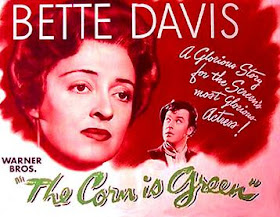 The Welsh mining town of Glansarno is in a tizzy - the new owner of one of the larger estates is arriving that day. They are shocked to discover that LC Moffat, M.A. is a woman - Lily Cristobel Moffat (Bette Davis), an educated woman who intends to use her inheritance to start a school for the local children. She enlists the services of Mr. Jones (Rhys Williams) and Miss Ronberry (Mildred Dunnock) to act as instructors in her free school but despite the high levels of illiteracy in the town, she finds herself in a battle with Sir Trevorby, the local Squire (Nigel Bruce) and pub owner Will Davis (Arthur Shields), both of whom see the school as a threat to their livelihoods. Our film this week is The Corn is Green (1945).
The Welsh mining town of Glansarno is in a tizzy - the new owner of one of the larger estates is arriving that day. They are shocked to discover that LC Moffat, M.A. is a woman - Lily Cristobel Moffat (Bette Davis), an educated woman who intends to use her inheritance to start a school for the local children. She enlists the services of Mr. Jones (Rhys Williams) and Miss Ronberry (Mildred Dunnock) to act as instructors in her free school but despite the high levels of illiteracy in the town, she finds herself in a battle with Sir Trevorby, the local Squire (Nigel Bruce) and pub owner Will Davis (Arthur Shields), both of whom see the school as a threat to their livelihoods. Our film this week is The Corn is Green (1945).Bette Davis shines as the tough-as-nails Miss Moffat in this retelling of the Broadway play. Loosely based on the life of playwright Emlyn Williams, the Broadway production starred Ethel Barrymore as the independent educator. Ms. Davis was only 36 when she took on the part - and would later say that she was perhaps a bit too young (Ms. Barrymore was 61 when she appeared in the play, and Miss Moffat was supposed to be in her 50s) - but Bette Davis was not averse to looking older for the film (TCM article). She brings grit and, when required, warmth to this single-minded woman.
The film introduced Joan Lorring (Bessie Watty) to the screen. Bessie is an avaricious, nasty piece of work, though with her mother, it's not hard to imagine WHY Bessie is the manipulator that she is. She especially loathes Miss Moffat (who she sees as the reason for everything that is wrong with her life), and goes out of her way to strike out at her nemesis. Originally, Bette Davis wanted Ida Lupino for the role of Bessy Watty (Dark Victory: The Life of Bette Davis by Ed Sikov), but she was not available. Angela Lansbury, Betty Field, and Andrea King were all tested - Ms. Davis selected Ms. Lorring, who got an Oscar nomination in the supporting actress category, and who called Ms. Davis one of her "teachers".
Several wonderful actors repeated their Broadway roles. Mildred Dunnock who doesn't know how to give a bad performance, reprised Miss Ronberry; Rhys Williams as the minister Mr. Jones and Sara Pugh (Gwyneth Hughes) are also excellent (AFI Catalog),. Nigel Bruce, however, was new to the cast and is at his fubsy best as the rather clueless Squire. Also added to the film cast was Arthur Shields, who makes a menacing publican.
One interesting aspect of the film (which is set in 1898) is that part of Miss Moffat's mission is to teach English to the locals. As was done in Ireland and Scotland, use of the native language was banned in place of English. Though it did not always prevent the locals from using the language, its use in the courts or even in places of business was illegal (Historic UK). As time progressed, Welsh began to die out; there were fears that it would no longer have any native speakers. However, in recent years, the number of native speakers has risen, and there is now hope the spoken language will continue to live (BBC).
While Bosley Crowther enjoyed Bette Davis' performance in the film, his review in The New York Times was not complimentary of the director nor of the film overall, saying "this humble, human story is not as intimate and moving on the screen as it was on the stage." But, Mr. Crowther spends a lot of copy comparing the film to Ms. Barrymore's stage performance - a performance that (unfortunately) that the rest of us will never be privileged to see.
We all enjoyed the film thoroughly, and heartily recommend it for your enjoyment. We'll leave you with a trailer:




No comments:
Post a Comment
Thanks for your interest in this blog. Your comments will be moderated to minimize spam to the website. Thanks for understanding.